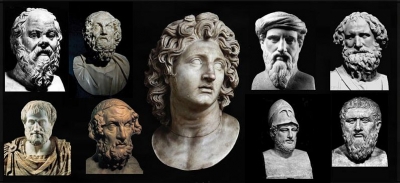
CLASSICAL WORLD
The civilizations of Ancient Greece and Rome are collectively known as the “classical world”. The word “classical”, in this instance, refers to culture of the highest quality. The Greeks were pioneers in science and the arts. They influenced the Romans, who spread this style of art, architecture, and literature across their own empire. Men in both societies were eager to find fame, often through military might.
HOMER
During the 8th century BCE, Homer wrote two great epic poems about the legendary Greek war against the city of Troy. The Iliad recounts the story of the Greek warrior Achilles. The Odyssey describes the adventures of another hero, Odysseus, as he journeys home after the war. Homer’s writing is so powerful that it is said to have influenced writers through the ages. He was so important to the Greeks that they simply called him “the poet”. Homer’s poems were originally sung or chanted, to the accompaniment of a lyre.
PYTHAGORAS
A philosopher, astronomer, and mathematician, Pythagoras lived in the 6th century BCE. He is remembered today for his work in geometry – particularly his theorem about triangles – but he was also a religious teacher. Pythagoras wanted to unlock the secrets of the Universe, and saw mathematics as the key to everything. He believed that numbers were the ultimate reality.
SOCRATES
Socrates (469-399 BCE) was an Athenian thinker whose influence on philosophy was so great that all earlier philosophers are referred to as “pre-Socratic” (before Socrates). However, unlike previous thinkers, such as Pythagoras, Socrates did not try to understand the Universe. He believed that it was more important to find the best way to live. Accused by his enemies of being a bad influence, he was put on trial and sentenced to death by drinking poison.
ALEXANDER THE GREAT
One of the world’s greatest generals, and bravest of soldiers, Alexander (356-323 BCE) was king of Macedon, to the north of Greece. After forcing the Greeks to unite under his leadership, he conquered a vast empire, stretching from Egypt to northwest India. By the time of his death, aged just 32, he had won lasting fame and was forever known as Alexander the Great.
PERICLES
A statesman and general, Pericles (c. 495-429 BCE) was a leading figure in Athens when the state was a democracy (meaning “power by the people”). He filled Athens with temples, such as the Parthenon, which was dedicated to Athena, goddess of the city. Pericles also promoted the arts, and made Athens the cultural centre of Greece.
SULLA
As a Roman general, Sulla (138-78 BCE) was a ruthless and ambitious man. His quarrels with a rival general, Marius, led to the first in a series of bloody civil wars – in which Romans fought against each other. Sulla was the first general to march on Rome as the head of an army and seize power. Julius Caesar later followed his example.
JULIUS CAESAR
Politician, general, and writer, Julius Caesar (c. 100-44 BCE) is famous for his conquest of Gaul (modern-day France), which he described in his book The Gallic Wars. He also fought and won a civil war against a rival Roman general, Pompey. Caesar marched on Rome and was declared dictator for life. He was later murdered for acting like a king, which went against the principles of the Roman republic.
EMPEROR AUGUSTUS
Augustus (the revered one) was the title given to Julius Caesar’s adopted heir, Octavian, when he became Rome’s first emperor. Augustus (ruled 27 BCE-14 CE) took power after defeating his rival, Mark Antony, in battle. He ruled Rome for more than 40 years, and brought peace and stability to the empire after years of civil war.
AGRIPPINA
The wife of Emperor Claudius, Agrippina (15-59 CE) was a powerful and ambitious woman. She persuaded her husband to adopt Nero, her son from a previous marriage. She is thought to have then poisoned Claudius so that the 16-year-old Nero could come to the throne. At first, Nero was dominated by his mother, but he eventually grew tired of her interference and had her murdered.
TRAJAN
A Spaniard by birth, Emperor Trajan (ruled 98-117 ce) was the first Roman ruler to be born outside Italy. He was a successful general, and his conquests in the Balkans and what is now Iraq brought the Roman Empire to its largest size. In Rome, a famous column was built in his honour decorated with scenes of his campaigns.
Picture Credit : Google



